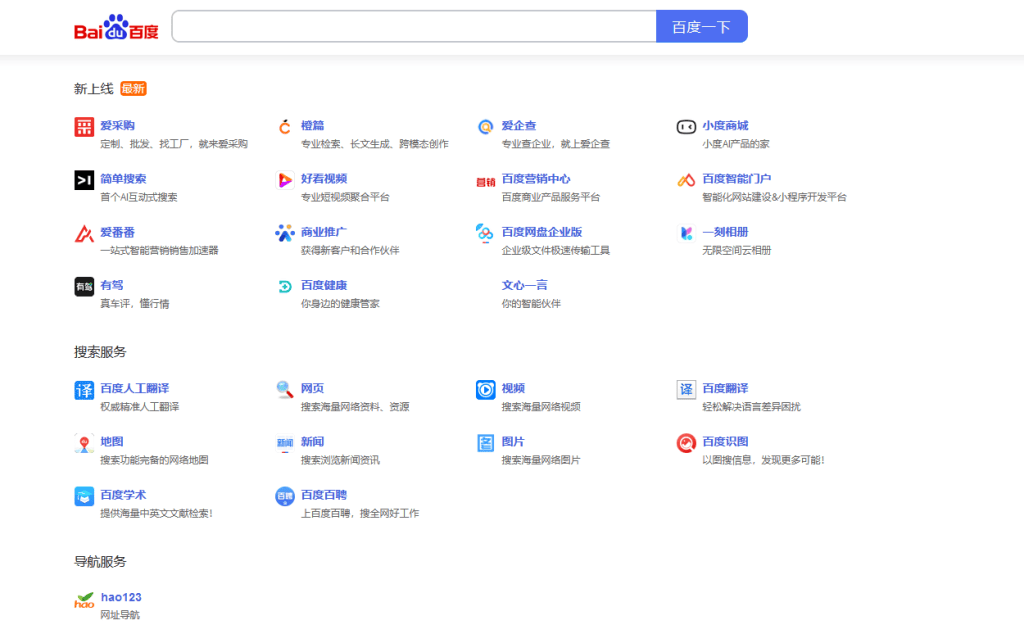Digital marketing strategies from the West don’t always translate well in the Chinese market. With a different digital ecosystem, platforms, and user behavior, one of the biggest challenges for international brands is mastering Baidu—China’s leading search engine.
You can think of Baidu as the “Google of China,” but that comparison only scratches the surface. While Google dominates over 80% of the global search engine market, it has minimal presence in China. In contrast, Baidu commands around 50% of all search queries in a country of 1.4 billion people. That makes Baidu an essential channel for brands looking to grow in China, but it also comes with its own rules.
This guide covers everything you need to know to optimize your content for Baidu and reach Chinese consumers effectively.
What Is Baidu?
Baidu, Inc. is a Chinese multinational technology company, best known for operating China’s most popular search engine. Founded in 2000 by Robin Li and Eric Xu, Baidu provides a full suite of internet-related products and services, including:
- Web Search: Similar to Google, users can search for websites, images, videos, and other types of content.
- Maps: Provides mapping services, including navigation and location-based searches.
- Baidu Knows: A Q&A platform where users can ask and answer questions.
- Baidu Tieba: A popular social forum network where users can create and join communities.
- Baidu Baike: An online encyclopedia maintained by users, similar to Wikipedia.
- AI and Smart Tech: Baidu is also investing heavily in AI, autonomous driving, and smart devices.
Because of its deep integration with Chinese-language search behavior, Baidu functions quite differently from Google. Understanding its unique ecosystem is the first step to building a successful SEO strategy in China.

Why Optimize Your Content for Baidu?
Optimizing your content for Baidu is essential if you want to succeed in the Chinese market. Here are some key reasons why Baidu optimization should be a priority:
1. Baidu’s Market Share
Baidu holds a dominant share of the search engine market in China, with 46.31% of searches as of May 2025. This dominance means that a significant portion of your target audience is using Baidu to search for products, services, and information. To reach this audience effectively, your content needs to be optimized for Baidu’s search algorithms.
Search Engine Market Share in China – May 2025
- Baidu: 46.31%
- Bing: 29.59%
- Haosou: 15.86%
- YANDEX: 4.24%
- Sogou: 2.03%
- Google: 1.38%
2. Tailored Search Algorithms
Baidu’s ranking algorithm heavily prioritizes localized content, simplified Chinese, fast-loading websites, and trusted Chinese domains. It also gives more weight to internal linking, meta descriptions, and domain age compared to Google.
3. Consumer Behavior Insights
Chinese Internet users have different search behaviors and preferences than their global counterparts. Baidu’s algorithms take these behaviors into account, making it essential for businesses to align their SEO strategies with local search patterns. For example, users in China may use different keywords and phrases than those in other regions, and Baidu prioritizes content that aligns with these local preferences.
4. Increased Engagement
Optimizing for Baidu can lead to higher engagement rates from Chinese users. When your content is relevant and optimized for local search behavior, users are more likely to find and interact with your site. This increased engagement can lead to better conversion rates and a stronger presence in the Chinese market.
How to Improve Your Baidu SEO: 9 Key Strategies
If you want to grow your digital presence in China, optimizing for Baidu is a must. But Baidu SEO is not just “Google SEO with Chinese text.” It requires a localized approach that takes into account different rules, user behavior, and technical requirements. Below are nine strategies that will help your website perform better on Baidu and reach more users across China.
1. Get an ICP License
To legally operate a website hosted in Mainland China, you must obtain an Internet Content Provider (ICP) license. This license, issued by the Ministry of Industry and Information Technology (MIIT), shows that your website complies with Chinese internet regulations. Without it, your site will face serious limitations—it may load slowly, appear untrustworthy to users, or be blocked entirely.
The process typically requires registering a legal entity in China or working with a local partner, as only Chinese businesses can apply. Hosting your site on a Chinese server with a valid ICP license also improves crawl speed and credibility on Baidu, which directly affects your rankings.
2. Use Simplified Chinese Only
Baidu is built for Chinese users, and it prioritizes content written in Simplified Chinese—the official script used in Mainland China. Using Traditional Chinese or poorly translated copy can lower your rankings and damage your credibility with users.
Avoid automatic translation tools. Instead, work with professional Chinese linguists who understand local expressions, keyword preferences, and writing conventions. Natural, localized language improves engagement, reduces bounce rates, and sends quality signals to Baidu’s algorithm.
Also Read: Simplified vs. Traditional Chinese: Which One to Choose for Localization?
3. Optimize for Baidu’s Algorithm (Not Google’s)
Baidu’s algorithm has different priorities than Google’s. For example, Baidu places greater emphasis on on-page SEO elements such as exact-match keywords, meta tags, and content freshness. It also relies more on manual indexing and may be slower to recognize technical changes like structured data.
Make sure your title tags, meta descriptions, and H1 headers are clear and keyword-rich in Simplified Chinese. Avoid relying too heavily on JavaScript, which Baidu’s crawlers may struggle to process. Use static HTML whenever possible, and structure your content with internal links that help Baidu understand your site’s hierarchy.
4. Optimize the Mobile Experience
China is a mobile-first market. A large portion of Baidu traffic comes from users on smartphones and tablets. If your website doesn’t perform well on mobile, it will struggle to rank.
Use a responsive design that adapts seamlessly to different screen sizes. Compress images and videos to speed up load times. Navigation should be intuitive, with clear buttons, concise menus, and fast-loading content. Mobile optimization also helps your site perform better in Baidu’s mobile app, which plays a big role in everyday search behavior in China.
5. Submit Your Website to Baidu Webmaster Tools
Baidu Webmaster Tools is an essential platform for managing your site’s performance on Baidu. Once your site is live, submit your sitemap to ensure faster and more complete indexing. You can also track keyword rankings, identify crawl errors, and monitor backlinks.
This tool gives you insight into how Baidu sees your site, helping you catch and fix issues that could hurt your SEO. Make it part of your regular workflow to maintain strong visibility in search results.
6. Build Quality Backlinks from Chinese Domains
Just like Google, Baidu rewards sites that earn backlinks from trusted domains. But in China, quality backlinks must come from local, reputable Chinese websites—especially those with .cn extensions or ICP licenses.
Focus on building relationships with Chinese media outlets, industry blogs, forums, and directories. Guest posting, PR campaigns, and content partnerships are effective methods. Avoid spammy link-building tactics; Baidu has become much stricter about penalizing unnatural backlink profiles.
7. Avoid Sensitive or Banned Content
China has strict content regulations, and Baidu enforces them. Any content that’s politically sensitive, culturally inappropriate, or violates Chinese law may be deindexed or flagged—sometimes without warning.
Make sure your website steers clear of restricted topics and follows Chinese content standards. Avoid sensitive keywords, and double-check translations to ensure nothing can be misinterpreted. This isn’t just about compliance—it’s also about protecting your brand’s reputation in the local market.
8. Integrate with Baidu’s Ecosystem
Baidu offers a wide range of platforms and services beyond search, and integration with this ecosystem can significantly boost your visibility. These include:
- Baidu Baike (similar to Wikipedia)
- Baidu Zhidao (a Q&A platform)
- Baidu Tieba (discussion forums)
- Baidu Maps
- Baidu PPC (Tuiguang)
Creating a Baidu Baike page for your company, participating in Zhidao discussions, or even launching PPC campaigns through Baidu Tuiguang can strengthen your domain authority and improve organic rankings. Baidu favors its own ecosystem, so the more touchpoints you create within it, the better.
9. Be Present on Chinese Local Platforms
Success on Baidu often depends on your broader presence across the Chinese internet. In addition to Baidu’s own platforms, build your visibility on high-traffic Chinese social media platforms such as WeChat, Weibo, Douyin (TikTok China), Zhihu, and Little Red Book (Xiaohongshu).
Sharing content across these channels helps drive traffic back to your website and builds your brand in places where Chinese users already spend their time. The more familiar users are with your brand, the more likely they are to click on your site in Baidu search results—another factor that can improve your SEO.
Final Thoughts
Getting Baidu SEO right is a long-term investment that pays off in visibility, trust, and real business results. By localizing your content, complying with local regulations, and aligning with user expectations, you’ll be in a strong position to compete in one of the world’s most important markets.
Baidu SEO is complex, but you don’t have to figure it out alone. At EC Innovations, we offer professional Chinese translation and localization services designed to help businesses succeed in China.
From SEO-friendly content creation to regulatory compliance and keyword research, our team helps you rank higher and connect better with your Chinese audience. Contact us today and let’s grow your brand in China.



